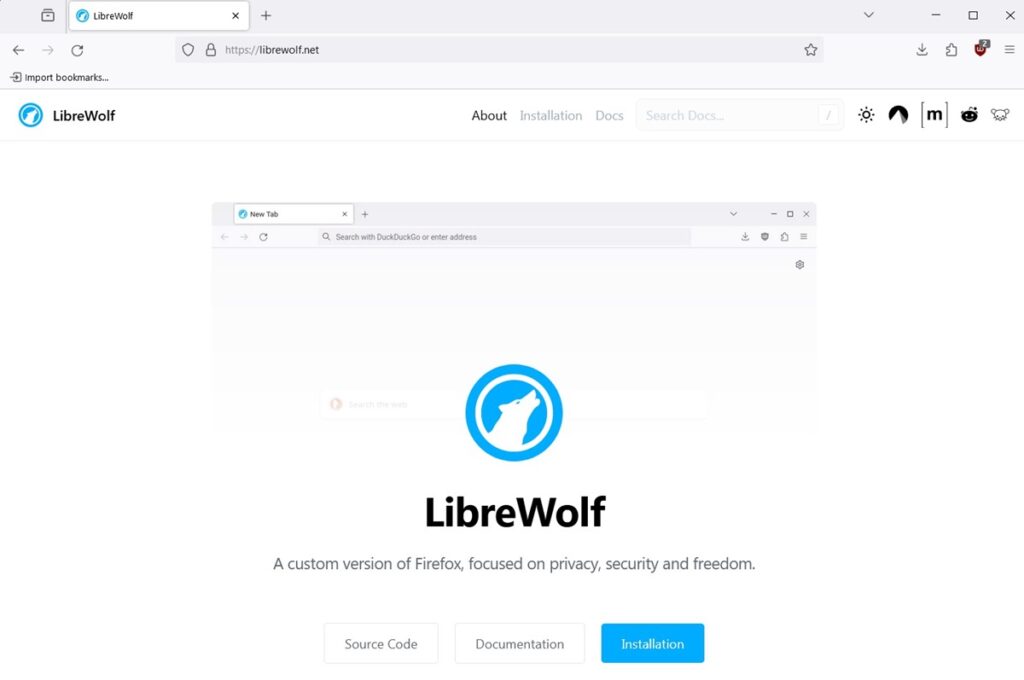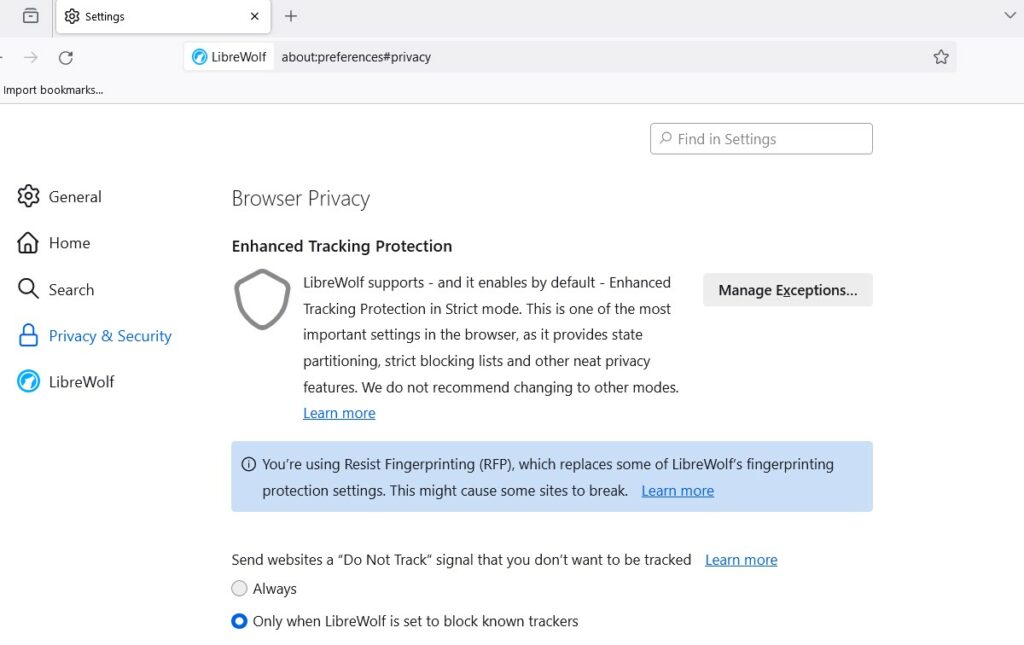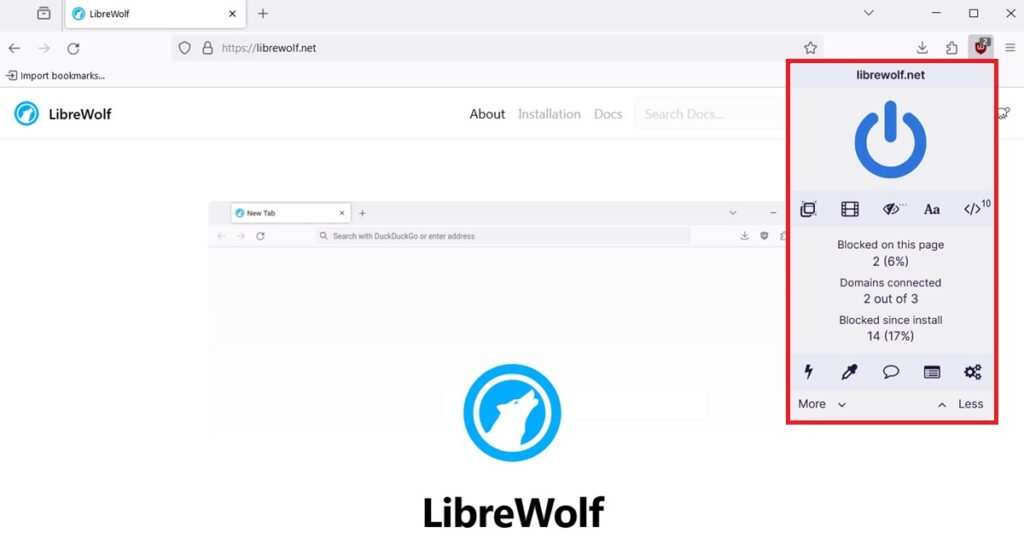If you haven't already heard of the name, LibreWolf is a web browser that's been making the rounds of late. This community-driven innovation is the only way to answer the call for heightened digital privacy.
Born from the open-source DNA of Firefox, LibreWolf isn't just a carbon copy but a refined version with its own set of promises. While it cherishes its roots, it aims to address some of the growing concerns of the tech-savvy community.
The question is, how does it truly measure up to its well-known ancestor, Firefox?
How LibreWolf Started: Vision Behind The Creation

LibreWolf is not a mere offshoot; it's a deliberate evolution. Born from the robust and open-source codebase of Firefox, LibreWolf took the baton with a clear goal: to prioritize user privacy and autonomy in an increasingly surveilled digital landscape.
The name LibreWolf itself is a nod to its commitment. “Libre” – derived from freedom – emphasizes its open-source nature and the liberties it offers users, ensuring they aren't boxed in by limiting features or intrusive trackers.
Drawing inspiration from Firefox, it not only retained the strengths of its predecessor but also introduced enhancements. It aimed to fortify the walls against trackers, ads, and other invasive elements, giving users a more controlled browsing experience.
Why is LibreWolf Necessary?
Firefox already had a strong reputation for being user-centric, so why LibreWolf? The answer lies in the changing dynamics of digital privacy.
As the internet became more commercialized, even the most trusted browsers had to make concessions. The tech community, constantly vigilant about such shifts, recognized the need for a browser that uncompromisingly upheld user rights. Thus, this new browser was born.
What LibreWolf Offers: Is It Just a Hardened Firefox?

From its very roots upward, LibreWolf seems designed with privacy in mind. The browser has tools that automatically block trackers, ensuring that your online footprint remains minimal.
Moreover, it's designed to resist fingerprinting, a technique websites use to identify and track users uniquely. However, the overall idea isn't just privacy but a perfect balance with usability and design.
To that end, it also delivers in spades on;
Performance
Performance is where LibreWolf truly shines. While it draws from Firefox's codebase, it has been optimized to deliver faster page load times and reduced memory usage. This ensures not just a seamless browsing experience but also less strain on your device's resources.
User Experience
LibreWolf cherishes the idea of individuality. Recognizing that no two users are the same, it offers many customization options. From its appearance to its functionality, users can shape the browser according to their preferences.
Add-on Compatibility
One of the strengths of LibreWolf is its compatibility with a wide range of add-ons, especially those designed for Firefox. Whether it's productivity tools, design enhancements, or security plugins, users can seamlessly integrate them , enhancing its functionality further.
Who Should Consider LibreWolf?
It isn't for everyone, that's for certain. However, that's okay. Its niche appeal is what makes it stand out. If you value privacy above all else, cherish community-driven projects, and don't mind a slight learning curve, then it might be the browser you've been seeking.
- Privacy Enthusiasts: For those who prioritize online anonymity and want to minimize their digital footprint.
- Tech-Savvy Users: Individuals who enjoy tinkering with settings and customizing their browsers for optimal performance.
- Community-Driven Individuals: Those who value being part of a passionate community and contributing to a product's evolution.
LibreWolf vs FireFox: Two Canines Compared

Both LibreWolf and Firefox share a common ancestry, rooted in open-source ideals. While Firefox has been a household name for years, renowned for its user-centric approach, LibreWolf emerged as an answer to the growing demands for even more privacy and user control.
Firefox has always been a proponent of user privacy, but LibreWolf takes it slightly higher. While both browsers offer tools to block trackers, the latter's default settings are more aggressive.
LibreWolf Outperforms Firefox
LibreWolf, with its optimized codebase, claims to have an edge in terms of faster page loads and reduced memory consumption. While Firefox offers a smooth experience, LibreWolf is lighter on system resources.
Customization and Extensions
Firefox is known for its wide array of extensions and themes. LibreWolf, while compatible with most Firefox extensions, places a higher emphasis on user privacy. While most add-ons work seamlessly, some might be restricted if they compromise the browser's security principles.
Community and Support
Firefox, being older and backed by Mozilla, has a vast community and robust official support. LibreWolf, though younger, has quickly built a passionate community focused on digital rights and privacy.
While Firefox's support resources are more extensive, LibreWolf benefits from a highly engaged community that shares solutions and workarounds.
Our Opinion: Does LibreWolf Make The Cut?
For those accustomed to mainstream browsers, this browser's heightened focus on privacy might initially seem overwhelming. Its plethora of settings, especially the enhanced security configurations, might require time and patience to grasp and utilize fully.
Due to it being essentially a more niche branch application, development in some areas also seems slow. For example, we note occasional compatibility issues, especially with specific niche extensions.
Patches and updates also seem patchy (no pun intended). Those hoping for a fast evolution to the top of the food chain will be disappointed.
Using a VPN Will Offer Better Universal Privacy
While browsers like LibreWolf are designed with privacy in mind, they primarily focus on your browsing activity. Other online actions, such as streaming, downloading, or using different applications, may expose you to potential risks or tracking.
A VPN, on the other hand, provides a blanket of protection over your entire internet connection. Even better is that you can use a VPN with any browser you prefer: Chrome, Edge, Safari, or Firefox.
These handy tools serve as a digital tunnel, ensuring that all your online data travels securely and privately, irrespective of which browser you use. They will encrypt your data, mask your IP address, and hide your location.
Check out our list of most highly recommended VPNs.
Final Thoughts
From our vantage point, LibreWolf makes a compelling case. However, opting for a VPN doesn't mean you must forego privacy-centric browsers. They can work hand-in-hand, offering an unmatched layer of digital protection.
After all, if you prioritize a vast ecosystem of extensions, frequent updates, or simply have a longstanding loyalty to another browser, then a switch might not be as enticing.
Ultimately, the decision lies in understanding one's digital needs and aligning them with the right tool. Whatever the choice, having options like LibreWolf ensures that the power remains where it should be—in your hands.